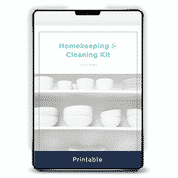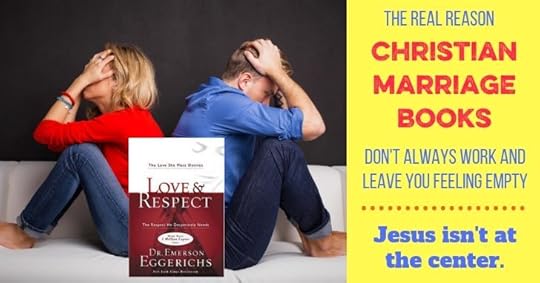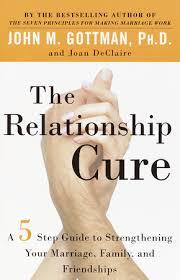Sheila Wray Gregoire's Blog, page 84
May 1, 2019
Treating Homemaking Like a Job Changed My Life–for the Better!
Homemaking is hard to do well.
Maybe you’re someone who’s really gifted at it (my youngest daughter falls into that category), but most of us find it a bit challenge.
When the kids were young and I was a genuine stay at home mom, I’d often find that a whole day would go by and I didn’t get a lot done. The house was often chaotic, which made me feel chaotic and out of sorts. It was difficult to relax at night with Keith, knowing that there was laundry on the bed waiting to be folded, or that the kitchen was a mess.
Now, I was a super productive person. I had completed two graduate degrees. I could program databases. I was really organized when it came to WORK. But when it came to home, I just wasn’t.
Things changed for me when the girls were about 4 and 6 and we started to homeschool, and everything got so much worse. We were at home all the time, often with a lot of big projects that made major messes. And I just wasn’t organized with meal planning, or cleaning, or errands. It seemed like we were always “running behind”, even when there were no real deadlines. I was always playing catch-up and rushing.

Katie’s 4th birthday party (she’s the one in the purple). My living room was always chaotic!
That’s when I did two things: I started working to a schedule with housework, AND I sought out help to learn how to do things better. When I got married and had kids, I assumed that I would instinctively know how to clean my house. But I didn’t. There are so many hacks and tricks that I had no idea about! And while I would readily use other people’s systems for writing research papers or organizing work, I never thought to seek out help when it came to laundry routines.
What was really cool was that I didn’t work longer hours. I actually worked fewer! But I worked smarter.
Homemaking is a job–or at least we should treat it that way. We have things to accomplish. We have a limited amount of time to accomplish them in. And what we’re doing is important.
Especially if we have children, homemaking really matters. It sets the tone of the house. When things are organized and running smoothly, then there are fewer things we have to worry about during our couple time. We can just enjoy each other–and enjoy the kids. Yet are we always able to give homemaking the energy it deserves?
Some of you are moms who have outside jobs, and some of you work at home. When there are two of you working outside the home, the tasks of homemaking do need to be shared. But when one of you is home full-time, most of those homemaking tasks should fall to that one person. (Not the childcare tasks–childcare is not a “job”. It’s a relationship. Both parents need to be involved in childcare!). If your husband is working outside the home, then you should be working, too!
The problem is that, when it comes to homemaking, there’s no one making us do anything. It’s easy to feel like you’re working because you go to menu plan, and you browse Pinterest for recipes, and soon a whole morning is gone. Or it’s easy to say, “I’ll make the bed after I check Facebook”, and Facebook turns into Netflix, which turns into a whole afternoon erased.
Even if you work outside the home, you probably find that this scenario pops up in the evenings or on weekends. You intend to get so much done, but you don’t!
We tend to think the problem is a character issue–“I must be really lazy”.
I guess that may be true. But I knew that wasn’t my problem. I wasn’t a lazy person. I was just really disorganized and I wasn’t gifted at homemaking. I needed some help.
Back then I turned to Flylady, but when the kids hit their teenage years I discovered another resource that I want to share with you today. The Ultimate Homemaking Bundle started. Once a year it launches with all new products at one amazing low price. It’s a collection of 104 products worth $2,294.37, but it sells for just $29.97!
This year the bundle includes: 30 eCourses & Videos, 28 eBooks, 25 printable packs, 16 workbooks, 3 summits & 2 membership sites
The Bundle only comes around once a year, for five days, and I like to share about it, because I know it can change so many of your lives. I’m not going to do a lot of posts on it this year, because I have other things on my list to write about, but I wanted to make sure you knew about it, because it’s simply an amazing resource, at a great price.
I buy all the bundles that become available, because at this low price, I know I’ll find 2-3 resources that will change everything for me. I don’t have to love them all; but when I go through the ones that pertain to me, I inevitably find new ways of doing things that help me get more organized and feel more on top of things, so that I have the time and energy for the things that really matter. Plus it’s simply really, really fun to read through all of this stuff and take the courses! And it’s a way more productive way to spend a few evenings than watching Netflix.
Think about it this way: When you’re trying to learn something at work, you take a course or go on training days. But when you don’t know how to do something well at home, you often figure that it’s a moral failure.
What if you simply need to take a course or get some tips?
Here are just a few that I’ve been looking at to hone my organization skills:



Homekeeping and Cleaning Kit helps you get organized. It tells you what to do on a daily basis, a weekly basis, and a monthly basis to keep your home clean. It’s super easy and anyone can follow it.
Journey to Clean: “My goal for daily cleaning is to leave my home cleaner than I found it that morning.” A little more in-depth and customizable than the Cleaning Kit, it also helps you figure out what cleaning tasks to do everyday to keep the home clean.
The Swap: The Lazy Genius Guide to Decluttering for Life isn’t a system as much as it is a value transformation. It helps you identify the roadblocks you have to peace in your house, and then looks at the opportunity cost of keeping things.
The Bundle also has resources on how to track habits, plan vacations, have awesome garage sales. The Baking Bootcamp teaches you the science and basics of baking so that you can make any recipe from Pinterest work! Maybe no one ever taught you that you’re not supposed to mix muffins very much. But HOW MUCH is too much? Get your questions answered!
There are even resources on parenting, marriage, working at home, and more.
The one resource that I’ve been using the most is LeanFit 1.0. I’ve been looking for a super clear exercise program that tells me what to do everyday, doesn’t take overly long, but covers all major muscle groups. This book is great–with what weights I should be doing when; how to do them; and what cardio to do in between. I had been searching YouTube for videos everyday, and this just makes it a lot easier!
Seriously, there’s so much, and it’s worth just seeing everything that’s in the bundle.

 Maybe it’s time for you to treat homemaking like a job, too, and get more organized. Learn some skills. And find joy and mastery instead of chaos!
Maybe it’s time for you to treat homemaking like a job, too, and get more organized. Learn some skills. And find joy and mastery instead of chaos!
Check out the Bundle here:
Take me to the Bundle!
I hope you enjoy it as much as I have!
What makes homemaking hard for you? Or are you one of those “gifted” ones? Let’s talk in the comments!
April 30, 2019
Top 10 Things to Know About Women and Arousal
How does arousal work for women?
For many of us it’s a big mystery! And if we’re going to aim to have mutually satisfying sex–where sex is not just about a man’s physical release, but is about a woman’s pleasure, too–then we need to understand how women feel pleasure.
I’ve written before about orgasm for women:
Need more help? Try these!


When You’ve Never Had an Orgasm: How to Experience the Breakthrough
But today I want to get much more fundamental. I think one of the reasons that women have such a hard time reaching orgasm is because we don’t have the building blocks there yet. We don’t necessarily understand how arousal works.
Last Friday we talked about how, when you’re first married, it’s more important to aim for arousal than it is to have sex, because too often people skip important stages in a woman understanding her body in order to get right to intercourse, but then it’s hard to go backwards. You associate sex with something “blah”, so your body doesn’t crave it, and your husband may not realize that you missed out on something. So I thought it may be useful to do some “sex ed” today and talk about how our bodies work.
Here, then, are 10 things that you may not know about arousal and women:
1. Women have erections, too
We know that the sign of man’s arousal is an erect penis, which is kind of hard to miss. But when women are aroused, the clitoris can go from around 3-4 mm in height to around 8 mm (though some women may be much larger). When women get erect, blood flow increases to the genitals, and the vulva gets engorged to make penetration easier.
2. Women have several physiological signs of arousal
Clitoral erection and genital engorgement aren’t the only signs of arousal. Women’s nipples get erect, and the areola (the darker part around the nipple) can swell by up to 25%. The pupils will often dilate (hence “bedroom eyes”), and she’ll tend to breathe faster and feel flushed.
3. Before orgasm, the clitoris retracts into the hood to avoid direct stimulation
After the arousal period, women will experience what is called “sexual plateau”, where the body is getting ready for orgasm. This usually requires stimulation to push her over the edge. During sexual plateau, engorgement will continue, but the clitoris will actually look less erect because it will retract into the clitoral hood–so it almost appears “flat” against the body. It becomes less about stimulating her directly there and more about rubbing against the whole region. Many researchers believe that the clitoral “roots” extend up into the vaginal wall, and form what we know of as the G-spot. As he makes contact with the public bone during intercourse, it stimulates the whole region and even the interior vaginal wall.
4. Women have several different erogenous zones which can lead to arousal
Some of these zones are more powerful than others, but the ears, neck, mouth, backs of knees, inner thighs and inside of arms can be erogenous zones. So can toes (if you’re not overly ticklish!). We tend to think of the breasts and the clitoris being the biggest erogenous zones, but it’s often better when trying to get aroused to warm up with other things first to help you calm your mind, settle into it, and look forward to what’s coming. Starting right away with the clitoris can be overpowering for some women. Especially for women with sexual abuse in their past, too, warming up with other erogenous zones, or even with a massage, can help overcome some flashbacks or negative connotations. If you want to explore more ways to slow down foreplay and enjoy some of these other erogenous zones, do check out my Sexy Dares!
Does your marriage need some spicing up–and some fun?

Try these 24 dares–plus one bonus–to take your marriage to the next level!
Let's add some heat!
5. Women’s sexual response cycle is different from men’s
Men’s sexual response cycle usually looks like this:
desire (libido)–arousal (excitement)–orgasm–resolution.
But for women, it can look a little bit different.
arousal (excitement)–desire (libido)–orgasm–resolution.
For some women desire comes first, but for many the feeling that you actually want sex doesn’t really kick in until stimulation has begun. Women tend to be responsive when it comes to arousal and desire, meaning that we tend to respond to stimulation rather than feeling something on our own beforehand.
6. Sometimes (but not always), arousal can be impossible, no matter what stimulation is being provided, if their brain is not “into it”
At the same time, this doesn’t mean that women automatically get aroused with stimulation. It can happen (more on that in a second), but often our brains still have to be positively engaged or else arousal and desire won’t follow. He can be doing amazing sexual moves, but if you’re writing a grocery list in your head, you won’t feel it. This is different from necessarily feeling “turned on” first (or feel desire first). You may not feel in the mood, but if you’re thinking, “I’m going to enjoy this”, and if you start deliberately concentrating on the stimulation and your breathing, arousal often follows.
7. Arousal usually starts in the mind, not the body
That’s why arousal usually starts in our minds, not our bodies. He does something to you, and because you’re paying attention, and because you’re looking forward to this, your body follows. When those two things aren’t there, then arousal during sex is often much more difficult.
But “usually” and “often” are the keyword here. It’s not ALWAYS. In fact, rape victims have been known to orgasm, and some posit that it’s because the heightened state of fear can cause our bodies to react more than usual to stimulation. Just because someone is physical aroused does not mean that they consented. This phenomenon is known as arousal non-concordance–when our subjective experience is different from our physical experience. For many of us, our minds want to be aroused but our bodies don’t follow. For others, our minds DON’T want to be aroused but our bodies take over.
8. The ability to “access” your arousal mechanisms is highly linked to sexual confidence
Because arousal is very linked to getting our brains engaged in the process, our attitudes towards sex and our sexual confidence are highly linked to our ability to get aroused. When we feel ashamed of our bodies, ashamed of sex, or when we feel like sex is only for the guy, then we’re less likely be able to feel aroused. A woman who is sexually confident can often feel “turned on” by life–she goes through her day confident of herself and who God made her; delighting in what’s around her; and when she directs her attention to her sexuality rather than her surroundings, arousal is often not far behind. But when sex becomes an obligation, and sex seems like something distasteful, then the only mechanism she has for arousal is from stimulation, which doesn’t always work.
When a woman feels sexually confident and gives herself positive messages about sex, and then she also gets good stimulation from her husband, arousal is often much easier. But when she only has one and not the other, arousal is often quite difficult.
9. A woman can be aroused without being “wet”
Women can feel cognitively aroused (she’s enjoying herself and wants sex!), and can even have some engorgement, but not feel overly wet. Some women do not produce as much lubrication naturally as others. Lubrication can also vary depending on the time of the month, with lubrication being much easier right before ovulation and a little harder right afterwards.
For women, too, arousal can be much more linked to what’s going on in the brain than for men. In fact, some women can “think” themselves to orgasm without any stimulation at all. When this happens, women often experience less lubrication than when arousal is focused primarily from stimulation.
If you find that you’re just not able to get lubricated, even when you subjectively feel “turned on”, just pick up some lubricant! It doesn’t cost very much, and it can make the world of difference.
10. When menopause hits, a woman can mentally feel aroused while her body doesn’t necessarily do what it once did
Because of changes in hormone levels, a woman’s body after menopause often has a harder time with lubrication. Blood flow to the genitals is also reduced, and changes in the vaginal wall can make engorgement more difficult. That doesn’t mean that she can’t enjoy sex–it only means that she may need more lubrication and more stimulation first! Use it as an excuse to draw things out and take things more slowly. It can still feel wonderful!
What do you wish you had known before you were married? Let’s talk in the comments!
Learn Great Sex Tips!


Author
Social Media
Sheila's Best Posts
Books
Courses
Freebie
 Sheila Wray Gregoire has been married for 27 years and happily married for 22! She loves traveling around North America with her hubby in their RV, giving her signature "Girl Talk" about sex and marriage. And she's written 8 books. About sex and marriage. See a theme here? Plus she knits. Even in line at the grocery store.
Sheila Wray Gregoire has been married for 27 years and happily married for 22! She loves traveling around North America with her hubby in their RV, giving her signature "Girl Talk" about sex and marriage. And she's written 8 books. About sex and marriage. See a theme here? Plus she knits. Even in line at the grocery store. Find Sheila Here:
Find Sheila Here:YouTube
Sheila's Favorite Posts on To Love, Honor and Vacuum:
10 ways to initiate sex
10 Effects of Porn on Your Brain, Marriage, & Sex Life
Why So Much Marriage Advice is So Trite
How can Sex be Hot and Holy at the Same Time?
Check out some of Sheila's Books:
The Good Girl's Guide to Great Sex
31 Days to Great Sex
9 Thoughts That Can Change Your Marriage
To Love, Honor, and Vacuum
Check out Sheila's Courses:
The Boost Your Libido Course
The Whole Story: Talking to Your Daughter about Sex, Puberty, and Growing Up
The FREE Emotional Intimacy E-Course
Are you ready to take your marriage to the next level?
Sign up for our emails and get access to the TLHV free marriage and parenting resource library. We have over 25 downloads and are constantly adding more. Sign up here!
April 29, 2019
Reader Question: What About Sex after Sexual Abuse?
Your whole outlook on sex has often been poisoned, so that it’s something icky, destructive, manipulative, and even evil. And now you’re married to a man you love, and your husband wants to make love, and you find yourself resenting him, resenting God for even creating sex, and truly struggling.
What do you do?
I had a comment from a woman named Carol that I want to share with you, and then give my thoughts for why there is hope. Here’s what Carol said:
I have had many problems in this area for our WHOLE marriage of 20 years. I wanted to offer some advice to those of you who suffer from a sexual abuse background. When I met my husband he told me that he was not interested in sex and I thought to myself YAY!!! Finally I found a guy who doesn’t want to jump in the sack with me every moment of every day…I was thrilled, beings I had been abused and had a toddler, my mind just was not into that at all!!! We were 20 and 21 when we met.
Well, turns out that he was interested in sex he just didn’t know it because he hadn’t had it the way I had. Turned into a whole lot of problems and arguments and crying. He didn’t really know how to help me with the abuse factor and in turn made it worse so it just took a little longer to deal with. A few years ago he gave me the greatest gift a man could ever give his wife, he gave me full control of the sex life. He still initiated but if I didn’t want to, there was no pouting, no asking why not? or making me feel guilty and unsafe.
Last year on Mother’s Day I broke down and even though he had done this great thing for me the guilt was still there, every time he wanted to and I didn’t I felt guilty (not his fault at all). That guilt was coming from inside me. I cried and cried and screamed at God for letting this happen to me and why did he do this to me, I got angry. My husband said he had never seen me cry like that before and I really don’t remember ever crying loud and angry like that before either. Something happened in that moment…I let that little girl that I had been shoving away for so long and telling her to shut up, I let her let it out and then in my minds eye I hugged her and told her it was ok and that I can handle it now from here on out and whenever she needs me to let me know and I will take care of her.
See, I had been pushing her away because she was ruining my marriage I thought all these years if I could just ignore her she would go away…Nope that didn’t happen, I needed to pay attention to her and give her comfort and let her know that it is all ok now and I can do this without her screaming at me that it is unsafe. She was stuck in that abuse and I was moving on, it was like having a split in the core of my being and now we are one. I hope this helps another abuse survivor to not have to go through 20 years of torment and guilt or if you are going through it for a long time already to understand why and maybe this will help. God Bless!!!
Isn’t that beautiful? She truly was able to put it in the past, with God’s help. Let’s look at how you can do the same thing.
1. Realize that the Abuse was the Problem
This may sound strange, but try to get angry at the abuse, and not at sex. What often happens is that people transfer their anger onto God for making sex this way, because it seems impossible to believe that sex could be anything other than painful or awkward. And so we get mad at God. They figure the rest of the world is lying to them or mocking them when they say that sex is great, because they don’t see how that can be the case.
You may not be able to see a way out now, but pray and release it to God, and say something like, “I know you created sex to be beautiful. I know that you created sex for my enjoyment. I know that you created sex to help me show love to my husband (and for him to show love to me.” Say the things you know are true, even if you don’t feel them. Because they are true! It is not that sex was made wrong; it is that someone poisoned it for you in the past.
2. Realize that God is Angry That You Were Sexually Abused
Just like Carol had to, you need to grieve for that little girl and what she lost. God was angry when the little girl inside you was hurt. He was livid. Matthew 18:6 says:
But if anyone causes one of these little ones who believe in me to sin, it would be better for him to have a large millstone hung around his neck and to be drowned in the depths of the sea.
God is angry at the abuse. He will fight for you. You may not see it, but there is justice. But God will take care of it. You don’t need to. You don’t need to stay angry because God is going to fight on your behalf. You can let it go. And if you let go of your anger, then you’ll find it much easier to move forward.
3. Seek out a Counselor
Letting go of your anger, though, is something that’s much easier to do with a trained person to help you.
When you’ve been a victim of childhood trauma, you’ve been wounded. Those wounds may be invisible, but they’re still there and they need to be treated. Licensed counselors have different therapies that have been shown to work with sexual abuse survivors, including EMDR. Seek out a licensed therapist and really get some help. (Not all therapists are created equal; if your church offers only biblical counseling, please be aware of these issues and ask these 10 questions first). Yes, it will be painful, because you’ll have to dredge up a lot of stuff. But if you don’t do it, then that stuff will still be controlling you. Don’t give someone who stole your childhood the power to steal your marriage, too.
4. Reframe How You See Sex
Now let’s get to the sex part.
Past sexual abuse has likely warped sex in your mind, so it’s going to take a while to make it seem beautiful again. Take things extremely slowly with your husband. You need to believe that your body has a healthy sex drive, that it can respond to touch, that you can relax and trust, and none of that can be rushed.
Your husband may have a hard time taking it slowly, but let him know why, and what it is you’re aiming for. Let him know that you want a great sex life, but you have to find a way to reawaken your body first.
And then here’s what you do:
Get used to being naked
Learn to enjoy your body. Lie naked and just your husband touch you. Sometimes that’s easier in a bathtub, but ask him what he likes about your body, what parts he enjoys, and really listen. Listen to what your husband thinks about your body. That is truth.
Get used to his body
Then take some time and turn the tables and just touch him. Explore him, with the lights on. Have him talk while you do this so that you can hear his voice and keep remembering “this is my husband’s body”.
Let him arouse you
Like I said last Friday, sometimes the goal needs to be arousal, not sex (or a particular sex act). Now your body may feel as if it can’t get turned on, but it can. You just need to be very relaxed and have some time. So one night, with the heat turned up in the bedroom so you’re not shivering, let him just touch you slowly. Even set the timer for 15 minutes, and don’t let him stop during that time. Don’t do this with the goal to have sex, because that can add stress for you. Just do it with the goal to become aroused, so that you can see that your body can respond.
And if there are certain parts of your body that have really negative connotations to you, because of what was done to you, have your husband concentrate on other parts first. It’s okay to leave that until after more counseling. Even start with something innocuous, like sucking on fingers and massaging the backs of your knees.
Talk
Finally, when you do make love, keep talking. Keep hearing his voice. Ask him to say “I love you” a lot, so that you remember what this is about. And whenever you make love, don’t rush it, at least for the first few months when you’re trying to retrain your body. You need confidence that your body can respond, and so you don’t want to slip back into bad patterns.
Listen, ladies. If you’ve been sexually abused, something was stolen from you as a child.
But you’re an adult now, and it’s up to you whether or not you want to let that abuser keep stealing from you, or whether you’re going to pursue wholeness again. Please pursue wholeness. I know it may seem impossible to believe, but you can achieve it. God can fight for you. He can bring justice. You can let go. And you can have that full life that should have been yours to begin with. You can win the victory here, with God. But that will only happen if you decide to deal with it.
Don’t believe the lie that sex was created for everyone but you. It wasn’t. You were created to enjoy sex, and no matter what happened to you, you can enjoy sex. I will pray that everyone reading this will one day experience that.
I’d love to know–if you have abuse in your past, what helped you? Or how is it affecting you today? Let’s talk!
Author
Social Media
Sheila's Best Posts
Books
Courses
Freebie
 Sheila Wray Gregoire has been married for 27 years and happily married for 22! She loves traveling around North America with her hubby in their RV, giving her signature "Girl Talk" about sex and marriage. And she's written 8 books. About sex and marriage. See a theme here? Plus she knits. Even in line at the grocery store.
Sheila Wray Gregoire has been married for 27 years and happily married for 22! She loves traveling around North America with her hubby in their RV, giving her signature "Girl Talk" about sex and marriage. And she's written 8 books. About sex and marriage. See a theme here? Plus she knits. Even in line at the grocery store.
 Find Sheila Here:
Find Sheila Here:
Facebook
Twitter
Instagram
YouTube
Pinterest
Sheila's Favorite Posts on To Love, Honor and Vacuum:
10 ways to initiate sex
10 Effects of Porn on Your Brain, Marriage, & Sex Life
Why So Much Marriage Advice is So Trite
How can Sex be Hot and Holy at the Same Time?
Check out some of Sheila's Books:
The Good Girl's Guide to Great Sex
31 Days to Great Sex
9 Thoughts That Can Change Your Marriage
To Love, Honor, and Vacuum
Check out Sheila's Courses:
The Boost Your Libido Course
The Whole Story: Talking to Your Daughter about Sex, Puberty, and Growing Up
The FREE Emotional Intimacy E-Course
Are you ready to take your marriage to the next level?
Sign up for our emails and get access to the TLHV free marriage and parenting resource library. We have over 25 downloads and are constantly adding more. Sign up here!

The Best 31 Days of Your Marriage!
Read a few pages. Do what it says. Have incredible fun!
Learn to talk more, flirt more, and even explore more! You'll work on how to connect emotionally, spiritually, AND physically. And the ebook version is only $4.99!
.
April 26, 2019
Should You Aim for Arousal, Not Sex?
What if the reason sex doesn’t feel good for some women is that they haven’t had a chance to learn what arousal feels like?
It’s Rebecca on the blog today. We get a ton of emails and comments from women with low libido, and a lot of them are quite similar to this woman’s question:

Reader Question
So what do you say to the wife who has never had an orgasm, and for whom the physical aspect of sex is just unpleasant and uncomfortable? I really don’t understand how people enjoy this at all, but obviously my husband does. We have sex fairly often, sometimes I have a good attitude and sometimes I’m quiet but just hoping it will be over quickly because I’m so tired and being touched so much makes me want to cry. We married as virgins, there have been no affairs and no porn, I just don’t like sex.
It’s easy to blame low libido on external factors. If your husband uses porn and you don’t want to have sex, that’s very understandable and the porn needs to be dealt with. There may have been past abuse that is impacting you. Sometimes there are health factors that make sex uncomfortable or painful. Sometimes it’s just that the marriage isn’t great. But when the usual suspects are ruled out and we’re left with an awesome marriage and a woman with zero interest in sex, where is the problem coming from?
I believe that a lot of women enter marriages never knowing what being aroused actually feels like.
I don’t think by any means this is the case for all women who struggle with low libido or just a general distaste for sex. But we get comments and emails like the one above all the time–they did everything right, they got married, but she just never felt fireworks. And it makes sense.
We tend to think of sex like a switch, when really it’s a learning process.
Couples are told “don’t have sex” before marriage and then they get married and we say, “now have sex.” We don’t start with the basics; it’s like teaching someone to read by giving them Dante’s Inferno instead of The Cat in the Hat. Of course they’re going to hate reading–it doesn’t make sense and makes them feel stupid. Having sex before you’ve learned how to get aroused can feel the same way–it doesn’t feel natural, it doesn’t feel like you are built for it because it just doesn’t make sense.
For many women, sexual arousal happens in stages. First, there’s no sexual desire at all–it’s all just snuggling and hand-holding. Then you graduate to wanting to kiss. After kissing for a while, you start to want to make out. Once you’ve been making out for a while, it’s natural to want to touch him and have him touch you. Next the clothes start coming off. And it just escalates from there.
But here’s the thing: that process of arousal and wanting to go further, for women, often takes a long time. And too often we speed up the steps, so that we go from hand holding to sex in around 15 minutes on someone’s wedding night.
Many women get married having never done anything more than kiss or make out and then they go immediately to sex.
This means they end up skipping so many steps!
Now, many of these women may have been aroused before the wedding night and desperately wanted to go further but they’ve managed to practice self-control and so that they’ve been ready for wedding night sex for a long time and it’s finally here!
But for others? They got married and they weren’t ready for the final step yet. Their bodies haven’t actually craved it yet. Their bodies haven’t been taught, “this is how it feels to want your spouse; this is what it feels like to be sexually aroused.”
And then they get married, they have sex, and they feel nothing. And I’m not really sure why we’re so surprised.
I want to be clear: the answer is not to start having sex before marriage.
It is clear in scripture that God’s best for us is to save sex for our spouses. I am not arguing against that whatsoever. But what I am arguing is that if you are part of a couple where the woman just hasn’t ever felt fireworks, can we re-think what sex looks like?
Sometimes the answer isn’t just to have more sex–it may be to go through those skipped steps to learn about arousal.
Perhaps the problem in your marriage is not that sex can’t be great–it’s that you’ve skipped too many steps along the way. So as a couple, maybe it’s time to work through those steps together. But here’s the thing: if you want to learn how to get aroused, the goal can’t be to have sex–the goal is only to get aroused. That means there’s no pressure to have sex. And if sex doesn’t happen, you haven’t failed–you’ve done work to go through those steps to train your body to respond to arousal. It’s not likely going to go from 0 to 100 in one day.
I cover a lot of great tips for building intimacy and arousal to improve your sex life in the Good Girl’s Guide to Great Sex:
God made sex to be AWESOME!

It’s supposed to be great physically, emotionally, and spiritually.
Feel like something’s missing?
Check out The Good Girl's Guide to Great Sex!
For those of you who are engaged or dating now, can I ask you to re-think the wedding night and honeymoon?
What would happen if we started telling newlyweds that they don’t have to have sex on the honeymoon? To instead have baths together, to cuddle naked, to give each other massages while they kiss each other? To explore ways to please the other? And then to only do sexual things if they just can’t stop themselves? And that if one is ready and the other is not, there are other ways to be close sexually without penetration until both are ready.
Most women reach orgasm for the first time not through intercourse but through manual or oral stimulation anyway. If we determined to help her figure out how her body works before we went to penetration, we’d likely have fewer people like the letter writer wondering what all the fuss is about.
Obviously there will be many couples who are ready and rarin’ to go from the minute they say “I do,” but if you aren’t ready yet, there’s no shame in that. Be honest, and tell your fiance,
“I want to have an awesome sex life with you. And so I’d like to use our honeymoon to explore every inch of each other’s bodies and see how they tick and what makes us feel good so that when we have sex it’s great for both of us and I feel ready for it. I want to start this important part of our marriage off right.”
And if you aren’t sure yet if you are ready, be honest about that, too.
The great part, too, is that if you feel unsure but then there is a moment where you think, “I want this so much!” You can just have sex. You’re married! So as soon as your body says YES, then you don’t have to hold back!
What I wish people could understand is that you will have a whole marriage ahead of you to have sex. And I believe that if more couples spent the early weeks of their marriages figuring out just what makes the wife “tick,” we’d see a lot of women with much higher libidos. Because when you go from 0 to 100 with no warming up, it can be hard to understand what is supposed to be happening. But it’s something that comes naturally when it’s new, exciting, and your goal isn’t sex, but to learn how to turn your partner on.
My Sexy Dares have a lot of emphasis on the man learning how to get his wife aroused and draw out foreplay, so if you’re looking for some help, that’s a great place to start!
If you are looking for some more tips to improve your sex life, check out these posts:
Learn Great Sex Tips!


10 Ways to Make Sex Feel Amazing for Him

How to Find a Safe Place to Learn More About Sex

31 Days to Great Sex Challenge
What do you think? Do you think couples who are virgins feel too much pressure to go straight to sex on their honeymoon? Do you think a week focused on exploring rather than just “doing it” would help couples start off their sex lives right? Let’s chat in the comments below!
Author
Social Media
Previous Posts
Products
Freebie
 Rebecca Gregoire Lindenbach is a 23-year-old Canadian blogger/author and the daughter of Sheila Wray Gregoire. Married since 2015, she is passionate about helping others challenge the status quo and live for more, whether in their relationships, their educational or occupational goals, or their walks with God. And yes, like her mother, she also knits.
Rebecca Gregoire Lindenbach is a 23-year-old Canadian blogger/author and the daughter of Sheila Wray Gregoire. Married since 2015, she is passionate about helping others challenge the status quo and live for more, whether in their relationships, their educational or occupational goals, or their walks with God. And yes, like her mother, she also knits. Find Rebecca Here:
Find Rebecca Here:Rebecca's Website
Other posts by Rebecca on To Love, Honor and Vacuum:
Retraining Your Brain to Fantasize about HIM--And No One Else!
Should it be a Struggle to Not Have Sex Before You’re Married?
10 of the Best Decisions You Can Make in Your First Year of Marriage
How To Not Be a Legalistic Parent
Why I Didn't Rebel (my most viral post ever)
Read the rest of Rebecca's posts on TLHV here!
 Check out Rebecca's book and course:
Check out Rebecca's book and course:Why I Didn't Rebel. Ever wondered why some kids rebel and some don't? Or do you believe rebellion is inevitable? Rebecca interviewed 25 young adults and dove into psychology research to find out: what makes some kids rebel, and some stay on the straight-and-narrow?
The Whole Story: Not-So-Scary Talks about Sex, Puberty, and Growing Up. Scared to talk to your daughter about puberty? Rebecca and her sister Katie want to do the hard part for you. This course is designed to start conversations to bring you closer together and strengthen your mother-daughter bond while giving your daughter all the information she needs as she becomes a woman.
Teenage rebellion doesn't need to be a part of your family's story. You can help your kids live for more! Get the first chapter of Why I Didn't Rebel for free here!
April 25, 2019
Can You Forgive? Are All Men Checking You Out, and More!
It’s time for a new episode of the To Love, Honor and Vacuum podcast!
I hope you all will listen, but if you don’t have time, I’ll have some links and rabbit trails below so you can read all you want as well!
Remember–to access all of the podcasts, you can click on “Podcast” on the menu, or better still, just subscribe on iTunes, Stitcher, or wherever you listen!
But first, here’s the podcast:
Main Segment: Can You Forgive and Move Towards Intimacy Again?
We’ve been talking this month about finding the balance between justice and mercy in marriage, and I thought some of you may need this message on forgiveness and moving past something difficult.
Forgiveness is a hard topic, because we certainly don’t want to rush forgiveness (and far too many of us do that!). And someone who has betrayed you does need to rebuild trust before full reconciliation is possible or advisable. However, at some point, if the person has repented, and has done things to rebuild trust, you need to make that decision to forgive and move on.
I hope this helps some of you dealing with a difficult marriage today!
Reader Question: My Husband Says He’s Tempted by My Best Friend!
Here’s one of those scenarios that makes me go, “Oh, man! That was so avoidable!” As I shared in the podcast, I may not be in the majority in terms of marriage advice on this one, but I do not believe that every temptation needs to be shared with your spouse, AS LONG AS you have someone else holding you accountable and you have confessed to someone else. I think you have to look at the bigger picture and ask, “will this help my marriage or hurt my marriage?”
Here’s the scenario:
A while ago he confessed to me that he has feelings of attraction for my best friend. He had talked to a mentor about it several months prior, which had taken care of those feelings. However, they resurfaced during a trip we took with this couple. ,,,All of this really devastated me. He insists that he has guarded his thoughts very well, not fantasizing or allowing his thoughts to wander, and that this is a normal thing that many couples face. He doesn’t feel a need to limit our contact with this couple. We talked with some mentors and a Christian counselor about this, and the counselor agreed that there was nothing to be concerned about. He tried to explain the male sex drive to me, and the difference between temptation and sin. …I feel like my normal meter is broken. Sheila, what am I missing? How do I get over the anxiety and pain? How do I thrive in my marriage again?
I’m left wondering–why would he tell her? Why would the counsellor think he should tell her? And now it looks like she is the one with the problem because she can’t get over it!
(She can likely benefit from the forgiveness portion of this podcast, but I’m not sure if she can even do that until the husband and the counselor recognize that he also has to rebuild trust now).
I wrote a bigger post a while ago about 10 things you shouldn’t share with your spouse, and here’s what I said there:

From 10 Things You Shouldn't Share with Your Spouse
I know a few couples who are super confident and who share everything, and who even keep each other up to date on who they think is hot at church, so their spouse can hold them accountable.
So perhaps some marriages can get away with this.
But in general, it’s not a good idea to tell your spouse you think someone else is attractive.
Here’s a story one Facebook commenter left:
I had a newlywed friend years ago who called me in tears because her husband confided in her that he didn’t find her as attractive as her sister. He wasn’t lusting after her sister or spending extra time with her or talking to her secretly. They barely knew each other and didn’t even live close, and she was much too young for him. This was just him matter-of-factly telling his young bride that she wasn’t as pretty. It killed her self-confidence.
She goes on to explain that this young man just wanted to start marriage right by being 100% honest and preventing problems before they occurred. But in this case, it just caused more problems when an affair with the sister wasn’t even a real threat.
Besides, talking about lust or finding someone else attractive just feeds those feelings. Keep your eyes on your spouse. If you notice someone else, instead of mentioning it, why don’t you take that moment to kiss your spouse and fill your mind with all the things you love about your spouse?
I have more I’ll say about this in just a minute, because in the comments section I talked about something similar!
Comment: Do We Know the Effect on Women When We Keep Talking about how All Men Lust?
I like to share a comment that someone has made on social media or the blog each week, and this one came out of a Facebook status. I was talking about how sometimes we’ll read things about how all men lust, and it’s important that women not become paranoid. If your husband has not given you reason to think he lusts, then it’s okay to trust him. Pray that God will reveal to you if you ever need to know anything, but remember that your husband honestly could be a good guy.
You can read it here!
Yes, some men struggle with lust. BUT NOT ALL MEN DO. If you have never had any reason to doubt your husband, then don'…
Posted by To Love, Honor and Vacuum on Sunday, April 14, 2019
That led to some interesting comment threads, but one discussion between Rick and Alice was interesting. Rick was saying that studies show that huge numbers of Christian men use porn and lust, and so we need to understand that.
And then Alice left these comments (I’ll combine them here):
Do you not see how knowing these facts and statistics could make a woman really, really cynical, and cause her to have huge trust issues with the men in her Christian community? I mean, the fact that the chances are even Steven that your pastor is doing porn on any given day? Yuck. Just super yuck. I have been dealing with the fallout from this sort of thing for DECADES. This also means that a huge portion of the Christian or church men that we deal with every day are very accomplished liars, as well. Another sick-making thought.
(and then replying to the idea that lust is just a sin, and all people sin):
I get what you’re saying about sin, and everybody in a church being on a level playing field with God. But please try to put yourself in my (or someone like me) place. If I’m standing around chatting after the weekly church service, and I stop to say hi to the pastor, or a guy who’s in my husband’s small group, or whoever. I’m standing there with my 15-year-old daughter by my side. I do not feel threatened by a man who struggles with the sin of gluttony. But I do feel threatened by the thought that there’s a 70% chance I’m talking to a guy who uses porn. I just do. Because I know that it is eroding his ability to see me and my daughter as human beings.
I think Alice makes an important point.
We simply need to change the language around this. When we say so loudly “all men lust” and “it’s every man’s battle”, we end up normalizing lust, which the Bible does not do. The Bible says that men who live by the Spirit should not lust. So we should start calling out this idea that it’s a sin that can’t be defeated.
Besides, all men don’t lust. Even if 70% of men say they lust, that means that 30% don’t. When we treat lust like it’s universal, then guys don’t think they can fight against it.
I know that so many of you who read this blog have husbands who struggle with porn or who use porn. I am so sorry for your pain. I have written so many posts about how to handle this in marriage. It is a huge issue. I was in Kingston last night watching a documentary on porn’s effects on our teens. It’s horrifying.
But it is not universal. And I want you wives especially to know that your husband can and should defeat this. God does not say that lust is the only thing a man will always struggle with.
Here’s a few posts from a series that I wrote on this a while ago that may help:

12 Ways to Help Men Overcome Lust

Why Every Man’s Battle Backfires
One more thing: Noticing is Not Lusting
I think I’ll write a whole post about this sometime, but one of the commonalities I see between the reader question and the comment is that too often I think we equate noticing a woman is attractive with lusting after her. I’ve seen that in the studies that measure lust as well. If you look at the wording in many of these surveys, my husband would likely be in the category of “man who struggles with lust”, even though he doesn’t, because the surveys equate noticing a beautiful woman with lusting.
If we tell teenage boys that noticing = temptation and they have to guard against temptation, they’re going to think they’re being tempted constantly. You can notice someone is attractive and then do absolutely nothing at all with that thought. At that point, it’s not even a temptation.
This man who confessed to his wife about the best friend could simply have been attracted to the best friend. But if he grew up hearing that being attracted to someone = lusting after them, then he may think he has a sin he needs to confess.
Then he confesses to something that actually isn’t a big deal, but he’s now ruined her confidence.
Look, some people are objectively very attractive. I am quite aware that there are many, many women more attractive than me, and I do not expect my husband not to notice that other women are attractive. I do expect my husband to only think about me sexually. There’s a big difference.
Maybe if we started talking about this better, we wouldn’t have these statistics floating around that say that 80% of men battle lust. And I think that would be far healthier. Yes, many, many do. And if they are fighting it–then that’s wonderful! But not everybody does, which is also good news, because it means that those fighting it can get over it.
Does that make sense? What do you think? Let’s talk in the comments!
PS: I didn’t do a millennial marriage segment this week because I was pressed for time. My cousin was visiting with her daughter, and I took them to visit Tammy (who works on the blog) and who currently has 11 border collie puppies at her house. Here are two pictures from yesterday!


So let’s talk! Is forgiveness too hard? Is noticing the same as lusting? Should we confess being attracted to someone else to our spouse? I’d love to hear what you think!
Author
Social Media
Sheila's Best Posts
Books
Courses
Freebie
 Sheila Wray Gregoire has been married for 27 years and happily married for 22! She loves traveling around North America with her hubby in their RV, giving her signature "Girl Talk" about sex and marriage. And she's written 8 books. About sex and marriage. See a theme here? Plus she knits. Even in line at the grocery store.
Sheila Wray Gregoire has been married for 27 years and happily married for 22! She loves traveling around North America with her hubby in their RV, giving her signature "Girl Talk" about sex and marriage. And she's written 8 books. About sex and marriage. See a theme here? Plus she knits. Even in line at the grocery store. Find Sheila Here:
Find Sheila Here:YouTube
Sheila's Favorite Posts on To Love, Honor and Vacuum:
10 ways to initiate sex
10 Effects of Porn on Your Brain, Marriage, & Sex Life
Why So Much Marriage Advice is So Trite
How can Sex be Hot and Holy at the Same Time?
Check out some of Sheila's Books:
The Good Girl's Guide to Great Sex
31 Days to Great Sex
9 Thoughts That Can Change Your Marriage
To Love, Honor, and Vacuum
Check out Sheila's Courses:
The Boost Your Libido Course
The Whole Story: Talking to Your Daughter about Sex, Puberty, and Growing Up
The FREE Emotional Intimacy E-Course
Are you ready to take your marriage to the next level?
Sign up for our emails and get access to the TLHV free marriage and parenting resource library. We have over 25 downloads and are constantly adding more. Sign up here!
April 24, 2019
Happy Couples Sweat the Small Stuff Part 2: Ask for Help!
Sometimes you just have to ask your husband for what you need!
I’ve been talking all month about how to change the dynamic in your marriage and start feeling close again. I wanted to end the month with super practical tips, and so I talked about how happy couples sweat the small stuff. Based on John Gottman’s marriage research, I showed how happy couples look for “bids for connection” and meet them so that they can build up that emotional bank account and feel cherished and loved.

The Micah 6:8 Marriage–Finding the Justice/Mercy Balance

Happy Couples Sweat the Small Stuff
And now there’s the second aspect of it–how to ask for something that you need, even if it means depleting the emotional bank account a little bit. You’ve built it up, you’ve got the goodwill there so that you can tackle some of the bigger issues.
Let me take you back to the first post of this series. I was telling you about Rick and Tiffany Bulman’s marriage from the book Mended, where they talk about how they recovered from an affair. But one of the things that had caused great emotional distance was that Rick didn’t understand how Tiffany felt loved and what Tiffany needed, and Tiffany didn’t know how to ask.
Here’s just one example: every night, before going to bed, she would check to make sure the windows and doors were locked. She had asked him to do it early in their marriage, but he thought that was silly (he grew up in the country where no one locked anything). She felt like he didn’t care about her safety, and that he was making her responsible for the family’s well-being. And she felt very unloved.
So let’s look at how this could be handled differently. How can you show your spouse how important something is to you?
A few quick things:
Usually when your spouse doesn’t pick up on something that you want or need, it’s not because your spouse doesn’t love you. It’s because you see the world in a different way.
Tiffany felt unloved, but Rick did love her. He simply didn’t share her need to feel safe. Growing up where everything was always unlocked, checking the locks wasn’t something he valued.
Because they see the world in a different way, they often don’t understand how important something is to you.
Tiffany did ask Rick to check the locks, but he didn’t follow through and didn’t pick up on its importance. He didn’t have the same worldview as she did, and so she asked him something, he thought about it, and figured, “No, I don’t really want to do that.” He felt it was just something that Tiffany was thinking about in passing, not something that was truly important to her, because in his mind, it wouldn’t be important.
We make lots of requests of our spouses, and not all are seriously important. Your spouse doesn’t necessarily have a way to know which ones really matter to you. It could be that your spouse is doing tons of things that don’t really register to you, but neglecting the few that really would. That’s why it’s important to communicate.
So let’s look at what that conversation may look like.
When you ask for something important, explain the significance.
Consider the conversation a chance for you to fill your spouse in on something about you that they didn’t know. So it’s not just about asking for help; it’s about sharing more about yourself.
Let’s see Joe and Jane Doe dealing with this:
Jane: Honey, before we go up for bed, can you just check and make sure the doors and windows are locked for me?
Joe: I’m sure everything’s fine. Don’t worry about it.
Jane: Hon, this is something really important to me. It was drilled into my head as a little girl that you have to make sure everything is locked, and every night my dad would check the windows and doors. If you don’t do it, I’m just going to have to do it because I won’t go to sleep otherwise. Would you mind taking care of it?
If they resist, don’t argue about the actual thing you need done. Talk about how you feel loved and close to your spouse.
The conversation could still go south here because they could end up arguing about the thing–the locks on the windows and doors–rather than the relationship dynamic, which is really the issue. That’s why it’s important to pull the conversation back to feelings, not to debating the importance of locks.
Joe: You’ve got to lighten up and stop worrying about stuff so much. You can’t live with that kind of fear all the time! It’s really not a big deal.
Jane: I know to you it isn’t a big deal, but to me it is. Even if you think it’s silly, it would make me feel really cherished and loved if you’d check the locks rather than making me do it–because either way, it’s going to have to get done. I just want to feel like you’re taking care of me.
If your spouse starts arguing about the validity of your feelings, then bring it back to how you can feel close.
Joe: Are you seriously saying that you don’t think I take care of you? Are you seriously accusing me of not loving you? That’s ridiculous. Look at all the stuff I do for you!
Jane: Oh, I know you love me, Joe. And I appreciate all you do for me. But sometimes we just experience love in different ways. One of the big things I need in marriage is to feel safe and cherished. I can’t explain it; I think it’s just the way I’m wired. When you do things that make me feel safe, I feel so loved by you. But there must be some thing that you need from me, too. What makes you feel loved by me? Why don’t we talk about that, too.
Identifying the emotional need is the key to resolving these sorts of things.
Too often when we ask our spouse for something and they refuse, we do end up arguing about that thing. But there’s always, always an emotional need at work. And when we can identify that need, we can often make progress.
We all have needs, like safety and security; having fun together; feeling cherished; feeling like you’re the sole object of their affection; feeling like you’re in this together, and you’re a team (especially a parenting team); feeling like you’re respected and valued; feeling like you’re sexually desirable; feeling like you’re sexually desired; and so many more. When conversations can revolve around those needs, rather than just what the spouse is doing wrong, the conversation is often a lot more productive. Instead of saying: “You’re bad/lazy for not doing X!”, you’re saying, “I have a need for Y. One way you can help me feel Y is if you do X.” Then you’re owning the issue, instead of just blaming them, and it’s a better dynamic all around.
In fact, you can go through this exercise together on making lists of small things you each can do to show each other love. That’s a great way to communicate to your spouse what your emotional needs are. That exercise is part of my 5-part email course on building emotional connection, which can also help!
What if your spouse promises they’ll do it, but they don’t follow through?
Let’s say that your husband is playing video games while you’re trying to make dinner and care for the kids, and it’s too much. And you say something like,
Jane; Joe, can you take the kids so that I can get dinner ready?
Joe: Sure, in a minute.
And then he keeps playing the video games. What do you do?
You can ask him again, but often a better route is this:
Jane: Joe, you said that you would help me, but you’re not helping me. You’re still playing, and your children and I need you right now.
Show him what he’s already promised to do, and tell him what the current state of affairs is. Later that night, when he’s no longer playing video games, she could have a talk with him, like the one above, about how she wants to feel like a team and like they’re in this together. That’s a big emotional need for her.
If this goes on and he still doesn’t help, or, in the above case, if she’s explained everything and he still doesn’t want to check the locks, you can say something like this:
Jane: Joe, when we married I wanted us to feel close and loved, but right now we’re growing apart. That’s not good for either of us. I have let you know what I need to feel loved. When you refuse to do these things, it makes me feel like none of that matters to you–as if you don’t really care about how I’m feeling. Do my feelings matter to you?
Joe: Of course they do! But you’re always coming up with new things for me to do. It’s like I’m never good enough. Don’t you love me?
Jane: Yes, Joe, of course I do. And I really want to talk about how we can make you feel loved, too. I care about that, and I don’t want you to feel like you’re not good enough. But let’s deal with this first issue first. Why would you not take two minutes to check the locks every night if it matters this much to me? I’m giving you this amazing gift–I’m telling you something you can do really quickly that would make me feel loved. Why would you not want to do that? (Or: Why do you think it’s okay to play video games while I’m caring for the kids and trying to make dinner all at the same time? Do you think that’s fair or right?)
If, after all that, your spouse really refuses to engage and try to listen to what you need to feel loved, then I would seriously suggest seeing a licensed counsellor or a mentor couple or something so that you can walk through this.
Deal with these small things early in your marriage
Don’t let patterns get established that are toxic to your marriage. In those early years, even if you don’t know how to start those conversations or you feel really vulnerable, have those conversations about what you need. Push through. Neither of you is used to having to accommodate a different person. Some of this will be rocky. But the more that you can push through now, and make these things known, the easier your marriage will be later.
If you develop bad patterns, though, they’re very hard to undo. Why does my wife suddenly want to start changing everything? Why is she so upset now when she’s been fine before? What’s wrong with her? Deal with things when they’re small, and you’ll likely have far fewer big problems later!
What do you think? Would these conversations work in your marriage? Let’s talk in the comments!
Like this post so far? You should also check out:

How to Talk So Your Husband Will Hear

My Husband Doesn’t Understand Me
Author
Social Media
Sheila's Best Posts
Books
Courses
Freebie
 Sheila Wray Gregoire has been married for 27 years and happily married for 22! She loves traveling around North America with her hubby in their RV, giving her signature "Girl Talk" about sex and marriage. And she's written 8 books. About sex and marriage. See a theme here? Plus she knits. Even in line at the grocery store.
Sheila Wray Gregoire has been married for 27 years and happily married for 22! She loves traveling around North America with her hubby in their RV, giving her signature "Girl Talk" about sex and marriage. And she's written 8 books. About sex and marriage. See a theme here? Plus she knits. Even in line at the grocery store. Find Sheila Here:
Find Sheila Here:YouTube
Sheila's Favorite Posts on To Love, Honor and Vacuum:
10 ways to initiate sex
10 Effects of Porn on Your Brain, Marriage, & Sex Life
Why So Much Marriage Advice is So Trite
How can Sex be Hot and Holy at the Same Time?
Check out some of Sheila's Books:
The Good Girl's Guide to Great Sex
31 Days to Great Sex
9 Thoughts That Can Change Your Marriage
To Love, Honor, and Vacuum
Check out Sheila's Courses:
The Boost Your Libido Course
The Whole Story: Talking to Your Daughter about Sex, Puberty, and Growing Up
The FREE Emotional Intimacy E-Course
Are you ready to take your marriage to the next level?
Sign up for our emails and get access to the TLHV free marriage and parenting resource library. We have over 25 downloads and are constantly adding more. Sign up here!
April 23, 2019
God Never Meant for Women to Be Invisible
As a woman, there are times that I have felt invisible.
Maybe some of my female readers will agree with me. But I’d like to talk about this today in a way that, hopefully, will point us back to Jesus.
I actually planned to have a really awesome post on 10 things to know about arousal and women today, and I’m still hoping to write that for next week. But honestly–I had an amazing weekend with the whole gang home, and I took yesterday off and didn’t get the work done that I was planning on getting done, so it’s not written. And at the same time I went on several rabbit trails in my head last night, and I’d like to try to share one with you. This post may be a little stream of consciousness, but I hope you’ll bear with me.
I was watching Special Victims Unit and knitting last night when an actress came on. She was playing a judge, and I knew I knew her from somewhere, but I could not place her. Then, about 2/3 of the way into the show, she tilted her head a certain way, smirked a bit, and said the word “justice” with incredible vehemence, and it all came back to me.
In the early 90s the Canadian government produced “heritage minutes” vignettes about Canadian history that aired on television constantly. Each a minute long, and each really well done, there were some about the Vikings discovering Newfoundland, the invention of basketball, Laura Secord and the War of 1812, Vimy Ridge, and many other Canadian things.
But my favourites were always the ones about the Famous 5. They were a group of women from Alberta and Manitoba who led the fight to get women recognized as persons in the British Empire. I’ll let Emily Murphy tell you about it (it’s only a minute long and worth the watch!):
If I could meet anybody in Canadian history, it would be either Emily Murphy or Nellie McClung, one of her fellow Famous 5 members. Nellie is actually my favourite. A devout Christian, her faith motivated her to fight for women to be given the vote and recognized as people. Nellie was also from Manitoba, the same province that my family hails from. What many of you may not know is that the women in Manitoba got the vote in 1916–the first women to be able to vote in the British Empire (and even before American women). That means something to me, as one whose heritage is from Manitoba.
Anyway, I saw Kate Nelligan (the actress from this vignette) tilt her head like that, and I recognized Emily Murphy. And I rushed to watch this vignette again. Which of course caused me to cry, because in twenty odd years I’ve never been able to watch this one without crying.
“I, Emily Murphy, of Alberta, and all Canadian women after me, persons under the law.”
In watching it last night, I realized that Kate Nelligan never actually said the word “justice” in this vignette. Yet when the actress said that word on Special Victims Unit, I recognized her immediately. I guess it’s because subconsciously, the word “justice” is what I always think of when I watch that heritage minute.
Anyway, I was thinking about that fight those women had just to be considered persons. All five of them were doing amazing things in their communities, yet they were “pooh poohed” and not recognized for it.
And I was thinking this on the day after Easter–a day when, all too often, we completely forget and ignore women.
How many sermons have you heard about how “everybody abandoned Jesus” on Good Friday? How many times have you heard that nobody stood with Jesus? That all of his friends deserted him?
I’ve heard plenty (though not from my current church, which is wonderful!).
Yet not everybody deserted Jesus. All his disciples did, yes. But the women who followed Him never did. They were with Him all the way, lining the street as He carried the cross. They were at the foot of the cross when He died, trying to give Him some emotional comfort. And they were the ones who were adamant about preparing His body for burial.
I am not saying that women are better followers of Jesus than men are. I am simply saying that those women should not be forgotten. We make the main story about Easter being the men deserting Jesus, but should not part of the story also be that it is possible to stay devoted, even in stressful times? These women are an important part of the Easter story who also have much to teach us, and they should not be erased, made invisible, or considered afterthoughts.
We know that the women were not afterthoughts to God, because it was to Mary that Jesus chose to reveal Himself and it was Mary who was chosen as the first missionary.
After the women showed up at the tomb and discovered that Jesus was not there, and spoke to the angels, they hurried back to tell the disciples. The women’s roles could have stopped there. John and Peter would have run out regardless, and Jesus could have appeared to them first.
But Jesus didn’t choose to appear first to Peter or John. He chose Mary (John 20:16). In fact, He even called her by name (which is how she recognized Him.) Mary, as an individual, mattered to Jesus. And Mary was chosen as the first missionary–“I have seen the Lord!”–to teach men that Jesus had risen from the dead. In Jewish tradition, testimony from women was often excluded. Yet Jesus wanted to upend that. Jesus appointed Mary to that task, even though she was a woman, partly, I think, because He wanted to show that women’s words mattered.
It’s interesting how much the Easter weekend story features women prominently being faithful to Jesus. Yet we rarely hear of that. (and more on that in just a minute).
In fact, too often Bible stories are interpreted in a way that minimizes women’s roles or maligns women.
Yesterday, I was also watching a debate unfold on Twitter between Dee from The Wartburg Watch and a whole slew of people. She was making the case (very strongly) that the story of David and Bathsheba (2 Samuel 11) is one of sexual assault and abuse. Think about it: David sends people (likely soldiers) to get Bathsheba for him. He then has sex with her. Did she consent? Could she have consented? You’re not allowed to say no to a king, after all–and he summoned her with soldiers.
Later on, David shows us what a tyrant he has become by having her husband murdered. Would she not have known he was this kind of tyrant at the time? It sounds remarkably to me like when Saddam Hussein’s sons would pick pretty women out of the crowd and have soldiers bring them to them. You couldn’t exactly say no.
When Nathan the prophet confronts David about this incident, he does not blame Bathsheba one iota. He lays all the blame at David’s feet.
Yet growing up, I was taught that Bathsheba caused this “adultery” by bathing where David could see her. It was her fault, you see. She asked for it. In fact, I even remember a sermon at a summer camp where they were saying that Bathsheba was deliberately enticing David. It reminds me of rape victims being grilled: “What were you wearing?”
Last year I wrote about how Queen Vashti, in the story of Esther, is commonly thought of as “the disrespectful wife”, when really she was simply refusing to be treated as a sexual object and was rejecting the king’s attempt to sexually harass and abuse her.
Too often, when women are the victims in Bible stories, they have been portrayed instead as the vixens. Or, when they are the heroes, their efforts have simply been forgotten or overlooked.
It is as if women are invisible.
And this is really what I want to get at:
When we treat women like they are invisible, we hurt the cause of Christ.
You see, to me, this is not about women and it’s not about men. I don’t want women to be elevated and men to be limited. I don’t want this to primarily be about women. What I want is for all of us to realize that when we make women invisible, when we discount their contributions, when we put them under men, we actually malign God.
Let me explain.

Genesis 1:27
So God created humankind in his image,
in the image of God he created them;
male and female he created them. (NRSV)
Both men and women are created in the image of God. And God created us to show different parts of who He is. God is not masculine; He contains the traits of both masculine and feminine.
To paraphrase my friend Jonathan Pease on Twitter last week, you can’t say:
Both men and women are created in the image of God
God created the genders to be different from each other to show us different aspects of God’s character
And then simultaneously say:
But we should minimize women’s contributions and elevate men’s needs and wants because that best shows us God
No, if both genders are needed to help us understand God, then when we minimize one gender, we lose the picture that God wanted to give us of Himself. And that matters.
That’s what I’ve been struggling with over the last few months, and it’s really been burdening me.
I always knew that too many aspects of Christianity minimized women, but until I read Love & Respect, I never realized how toxic it was. I’m sorry I keep harping on that book, but I cannot explain to you enough the effect that it had on me. For about a month after writing that series I was first stunned, almost in a stupor, then drained, then defeated. Since then I have been motivated to do something about it. I’ll be sending out everyone who is on my email list my final report about all the comments that came in, and a package that you can give your church about the book, if you so choose (if you’re not on my email list, sign up now to make sure you don’t miss it!). And last week I finished a book proposal for a series that I hope will put some of this bad doctrine to rest.
But this stuff is important, because of the role that we want God to have in our lives. Here’s why:
When we tell women that they must follow and obey their husbands, then we put husbands in the place of God in women’s lives. All of us, regardless of gender, should follow God’s will. When we equate a husband’s will with God’s will, then we actually put husbands above God, and that is more than wrong. That is idolatry.

The Fundamental Flaw in the Book Love & Respect

Is Your Marriage Following Jesus?
When we tell women that they must “win their husbands without words” rather than speak up about something that is bothering them, we take one verse out of context in Scripture and ignore so many others. God says that “iron sharpens iron”. God tells us in Proverbs and Ephesians and throughout the gospels about how we should point people to truth and how we should deal with issues that arise. When we tell women that they must keep silent, then, yes, we tell women that their needs are less important than their husbands’ needs. But more than that, we also take away from husbands the biggest tool that God has created to shape us into Christlikeness. Instead of a woman truly being a “helper”, we ask her to become an enabler. That, again, takes Christ out of the relationship.

Are You a Spouse or an Enabler?

Is this the Last Straw in Marriage?
When we tell women “do not deprive your husbands” of sex, then we reduce sex to something merely physical. When we talk about sex as if it’s only about a husband’s physical release, and that it’s not about a woman’s satisfaction or about any other kind of intimacy, then we take God out of the sexual relationship. God created sex as a mirror to show us how passionate He is about knowing us. Sex is supposed to be a deep, mutual knowing. When we equate it with giving a man an orgasm, then we take away one of the tools that God has given us for understanding true passion with Jesus. And we take away one of the best vehicles men have for learning to be attentive and caring of their wives, and instead point men towards selfishness.

Can the Do Not Deprive Verses apply to Women, Too?

It was way back in 1916 that Nellie McClung fought for Manitoba women, including my great-grandmothers, to get the vote. It was in 1929 that the British Empire recognized that women were persons. I wonder how long it will be before Christians realize that by minimizing and ignoring women, we actually deny God.
Both men and women are created in God’s image. Both men and women are needed to show God’s character. The relationship between men and women is supposed to demonstrate a mutuality and intimacy that points us to our relationship with God.
This is not about women and it’s not about men. It’s about God. We do need to get this right. And Easter seems like a good time to start doing something about it.
What do you think? How can we get people thinking beyond women and men and thinking about mutuality and putting Jesus first? Let’s talk in the comments!
Author
Social Media
Sheila's Best Posts
Books
Courses
Freebie
 Sheila Wray Gregoire has been married for 27 years and happily married for 22! She loves traveling around North America with her hubby in their RV, giving her signature "Girl Talk" about sex and marriage. And she's written 8 books. About sex and marriage. See a theme here? Plus she knits. Even in line at the grocery store.
Sheila Wray Gregoire has been married for 27 years and happily married for 22! She loves traveling around North America with her hubby in their RV, giving her signature "Girl Talk" about sex and marriage. And she's written 8 books. About sex and marriage. See a theme here? Plus she knits. Even in line at the grocery store. Find Sheila Here:
Find Sheila Here:YouTube
Sheila's Favorite Posts on To Love, Honor and Vacuum:
10 ways to initiate sex
10 Effects of Porn on Your Brain, Marriage, & Sex Life
Why So Much Marriage Advice is So Trite
How can Sex be Hot and Holy at the Same Time?
Check out some of Sheila's Books:
The Good Girl's Guide to Great Sex
31 Days to Great Sex
9 Thoughts That Can Change Your Marriage
To Love, Honor, and Vacuum
Check out Sheila's Courses:
The Boost Your Libido Course
The Whole Story: Talking to Your Daughter about Sex, Puberty, and Growing Up
The FREE Emotional Intimacy E-Course
Are you ready to take your marriage to the next level?
Sign up for our emails and get access to the TLHV free marriage and parenting resource library. We have over 25 downloads and are constantly adding more. Sign up here!
April 22, 2019
Some Easter Thoughts on Healing
We’ve gone to church, had big family dinners with extended family, and played a ton of board games.
And we’ve done a little bit of work, too (Connor and David have been filming some stuff for the boys’ version of The Whole Story).
But I’m going to take today off as it’s the last day everyone is home.
However, I’ve had this thought in the back of my mind all weekend, and I thought I would share it. It’s something that I say in my Girl Talk, and I thought it might be nice to say it here as well.
On Good Friday, we remember that Jesus died for us. He paid for all the things that we ever did. And that’s wonderful.
But what we may not always think about is that Jesus didn’t just pay for all the things that we did. He also paid for all the things that were done to us.

Isaiah 53:4-6
Surely he took up our pain
and bore our suffering,
yet we considered him punished by God,
stricken by him, and afflicted.
But he was pierced for our transgressions,
he was crushed for our iniquities;
the punishment that brought us peace was on him,
and by his wounds we are healed.
We all, like sheep, have gone astray,
each of us has turned to our own way;
and the Lord has laid on him
the iniquity of us all.
Look at what Jesus took on the cross: Our pain. Our suffering.
It wasn’t just our sin. It was PAIN. It was Sin with a capital S. It was the evil state of the world. Jesus broke its power–by paying the price for it, but then by rising again so that death AND sin no longer had its dominion over us.
And then it says:
By his wounds we are healed.
It doesn’t just say that by his wounds we are forgiven. It says that by his wounds we are healed.
We are healed from the guilt of what we did, yes. But think of it this way: If someone hurt you in the past, Jesus has already broken the power of that over you. He has created a way for healing. You don’t have to carry the bitterness and anger, because Jesus already paid for it.
That doesn’t mean that Jesus ignores it. On the contrary. It means that Jesus looked full on what was done. He saw it. He wept about it. He knows everything about it. And He chose to heal the breach. Here’s a clip of me talking about this in one of my Girl Talks:
I just think that’s important for us to realize. We focus so much on Good Friday being about our sin, but it’s also about our healing.
I don’t know what you all are dealing with. I’m so honoured that you spend time on this blog with me as we talk about marriage. But today I just want to point you to the risen Christ, who wants to be real in your life. He wants to see your healing, from the inside out. That healing may not be instantaneous (and it frequently isn’t). Often that healing needs to uncover a lot of ugliness so that you can look at it head on, and you can see it in the light of Christ. But I do want to encourage you today that by his wounds we are healed. Not just forgiven. Healed.
I think that’s beautiful, and I pray that you will start to experience the hope of that soon, if it’s something that you really need as well.
Author
Social Media
Sheila's Best Posts
Books
Courses
Freebie
 Sheila Wray Gregoire has been married for 27 years and happily married for 22! She loves traveling around North America with her hubby in their RV, giving her signature "Girl Talk" about sex and marriage. And she's written 8 books. About sex and marriage. See a theme here? Plus she knits. Even in line at the grocery store.
Sheila Wray Gregoire has been married for 27 years and happily married for 22! She loves traveling around North America with her hubby in their RV, giving her signature "Girl Talk" about sex and marriage. And she's written 8 books. About sex and marriage. See a theme here? Plus she knits. Even in line at the grocery store.
 Find Sheila Here:
Find Sheila Here:
Facebook
Twitter
Instagram
YouTube
Pinterest
Sheila's Favorite Posts on To Love, Honor and Vacuum:
10 ways to initiate sex
10 Effects of Porn on Your Brain, Marriage, & Sex Life
Why So Much Marriage Advice is So Trite
How can Sex be Hot and Holy at the Same Time?
Check out some of Sheila's Books:
The Good Girl's Guide to Great Sex
31 Days to Great Sex
9 Thoughts That Can Change Your Marriage
To Love, Honor, and Vacuum
Check out Sheila's Courses:
The Boost Your Libido Course
The Whole Story: Talking to Your Daughter about Sex, Puberty, and Growing Up
The FREE Emotional Intimacy E-Course
Are you ready to take your marriage to the next level?
Sign up for our emails and get access to the TLHV free marriage and parenting resource library. We have over 25 downloads and are constantly adding more. Sign up here!
April 18, 2019
The Podcast About Women and Porn (And Creepy Dudes!)
We need to get real about women and porn use–and women and erotica.
We tend to talk about porn as a man’s issue, but 30% of porn users are female, and almost all erotica readers are female. This is serious! So let’s get serious on the podcast today (and even if you don’t struggle with porn, please listen, especially if you have daughters, because I talk about teens and porn, too!).
I hope you all will listen, but if you don’t have time, I’ll have some links and rabbit trails below so you can read all you want as well!
How do you find the older podcasts?
The easiest way is to go to wherever you normally listen to podcasts–iTunes, Google Play, Stitcher, Spotify, whatever–and search for To Love, Honor and Vacuum and subscribe!
I’ve also put a link on the menu where you can find all my previous podcast posts. Or you can just go over to Buzzsprout where I host them! (But seriously, just subscribe! It’s easier).
Main Segment: Women, Porn, Erotica–and How to Find Intimacy Again
There’s a LOT of info in this segment, and I can’t summarize it all here. But basically I looked at how a porn problem often starts for women, and how an erotica problem can start. I give some tips on what moms can do if daughters are consumed by romance novels, and then talk about how stories and novels have an ability to influence our fantasy life even more than other mediums do.
(By the way, if you have any great suggestions about novels that teenagers can read, can you put them in the comments?)
Then I look at the effects of porn on women. Unlike men, women can hide problems much better. With men who use porn, sexual dysfunction often follows. But because women can become aroused just through fantasy far more easily than men can, a woman with a porn problem can actually look quite sexually responsive.
Finally, I talk about how to stop the need to fantasize to become aroused. Please listen, because this stuff matters! And if you struggle with porn, Covenant Eyes is a great tool for women, too.

I need that!
Millennial Marriage: What if my daughter is dating someone I don’t like?
Becca and I decided to tackle a reader question in our segment this week! I guess it’s not technically a millennial marriage question, but we were talking about young people and dating. Here was the question:
My eldest is 19 years old and away at university. We are a Christ loving and very happy family. Our children were homeschooled and we were quite laid back compared to most families that we know. Anyway, my daughter is becoming very interested in a young man at school. He is kind and open hearted, but he does not yet know Jesus as his savior. He comes from a broken home and has lived a much different life that our daughter. Should we intervene before they become too involved or should we trust God and our daughter to handle the relationship?
Our quick answer: you can influence, but you can’t intervene. And we talked about some great ways to do that!
(Incidentally, you may get a kick out of Connor’s text to me as he was editing the podcast):
And I was only kidding about that last part, by the way….
Connor’s great 
April 17, 2019
Happy Couples Sweat the Small Stuff!
It’s not big, blow out fights that wreck a marriage. It’s how we treat each other day to day. And that’s why happy couples sweat the small stuff!
I like to run a series on the Wednesdays of each month so that we can explore one topic in more detail. And this month we’re talking about how to feel emotionally close and how each of you can feel as if your emotional needs are met.
For the last two weeks–this Wednesday and next Wednesday–we’re going to explore what it means that happy couples sweat the small stuff. Essentially what I’m talking about is that happy couples do two things: they pay attention to the little things in marriage; and they deal with stuff while it’s still little, rather than letting it blow up. This doesn’t mean, by the way, that they make a big deal out of every little thing. Only that they express what they’re feeling and they ask for what they want when it’s still a little issue. And that’s important!
Other posts in our emotional connection series:

Mended: How to repair your marriage before it breaks

I want to take today, though, to explore in more detail something I talked about in a podcast a while ago–how happy couples respond to “bids for connection.” John Gottman, who is an awesome marriage researcher who has analyzed the way that couples act towards each other, the way they use body language, and so much more, is able to predict with 90%+ accuracy how a couple will fare in the next 5 years after watching their interactions for just a short time. And one of the things that he talks about at length is how couples respond to these tiny “bids for connection” throughout the day.
Gottman was the one who first talked about how each marriage has an emotional bank account, which you feed by showing your partner that you care about them and that you love them. If you’re going to make a “withdrawal”–say by bringing up an issue you’re not happy about; being gone for extended periods of time; or having one of your inevitable bad days, then it’s important to have a high balance in that bank account already.
Next week we’re going to talk about the withdrawals side of the equation–how to bring up small things that you’re unhappy about. But today I want to talk about how to make deposits into the bank account, and make your spouse feel emotionally connected.
Here’s what’s important:
In healthy marriages, the ratio of how people respond to these bids is 5:1. So for each negative response, or lack of response, there are 5 positive ones.
In unhappy marriages, the ratio is 1:1. That means that in unhappy marriages, there are still many, many healthy bids for connection. But in order to feel emotionally close and safe, that ratio must be more than 1:1. It’s not enough to make it even. You have to really show your spouse that you care!
And how do you do that?
It’s really quite simple.
Turn towards each other instead of away from each other.
Recognize Bids for Connection
A bid for connection is any time your spouse does something which signals that they’d like to engage in some way or that they’re reaching out to you. Here’s what bids may look like:
Your spouse says something, sighs, or makes some gesture revealing how they’re feeling.
Your spouse brings you a coffee or a glass of water or does some small thing for you.
Your spouse enters the room where you’re sitting.
Your spouse smiles at you.
Your spouse asks you for something.
Your spouse touches you.
In order to respond to these bids, though, we have to recognize them–which means that we can’t be so much in our own world that we ignore our spouse. You have to actively pay attention to one another. In fact, actively paying attention is one of the big things that separates marriage masters from marriage disasters (Gottman’s terms, not mine, but I love them!).
One example Gottman used: Your husband is reading an email, and he sighs. That’s a bid for connection! He’s revealed to you something that he’s feeling. So what can you do?
Respond Positively to Bids for Connection
Acknowledge what he revealed and show that you care. You could say something like this:
“That sounds bad! Did something happen?”
“Oh, oh. What’s wrong?”
“Can I help?”
Now, of course, simply acknowledging isn’t enough. You have to actually care. If you said something like, “What is it now?“, that’s not a positive interaction!
Or here’s another bid. You’re watching Netflix, and your spouse places a cup of coffee beside you. Smile, say “thank you”, look at them full on the face. Or, even better, get up, give them a kiss, and then you can go back to your show. That way you communicate, “I know you did something nice for me and I appreciate it.”
What would happen, on the other hand, if you did nothing? Your spouse brings you coffee, and you don’t even look up. How will your spouse feel? Will they do it again? Will they feel valued? Or will they feel dismissed and ignored?
Or how about this bid: You’re making dinner and you hear your husband come in the door. That can be a bid for connection, too! Do you walk to the door and greet your spouse, or do you keep doing what you’re doing and ignore your spouse? (This is one I’m working on! It really matters to Keith that I greet him when he comes home, but sometimes I get engrossed in chopping something and I wait for him to enter the kitchen. It’s so much better if we can meet halfway!).
Or how about this one: Your spouse is sitting beside you and he takes your hand. Do you smile at him, continue to hold his hand, or lean towards him? Or do you lean away or take your hand away?
Turn a Negative Response into a Positive One
What if your spouse gives a bid for connection and you don’t feel that you can give them what they want right now? What if, for instance, your spouse says something like, “Hon, I’d love to do something together tonight. What do you think?” And you’re staring down a pile of paperwork you need to get done before work tomorrow, or you’re just exhausted, or something else is preventing you from engaging with your spouse.
Then turn this negative thing into something positive.
“I truly wish I could. I love doing X with you! I just can’t tonight. But can we put it on the calendar for Tuesday?”
You’ve now communicated, “I do want to spend time with you. I do value you. I just can’t right now.”
Sometimes the negative cycle with bids for connection begins because we miss the significance of what our spouse is doing, or we think the bid is a criticism, rather than a cry for help. For instance, if your spouse says something like,
“I’m so tired. There’s no way I can get everything done I’m supposed to get done. I don’t even know if I can make it to Tommy’s game on Friday!”
You can interpret this to mean that your spouse is trying to get out of an important parenting duty, or you could see that your spouse is frustrated and hoping that you can help him destress.
“That’s really rough. Tell me all the things you need to do and let me see if I can help.” Or you could say, “Why don’t you just take 15 minutes right now and do nothing. I’ll get you a cup of coffee. You look so overwhelmed; just take a minute to yourself.” Or you could try, “It’s been like this before, and you’ve always gotten through it. I know you’ll get through it again. When do you think it will lighten up? Let’s figure that out!”
The key in sweating the small stuff: You just want to show your spouse that you care, and that they matter to you.
In fact, Gottman found that these small things are far more important in a marriage than any big romantic gestures. In his book The Relationship Cure, Gottman wrote:

From The Relationship Cure:
Maybe it’s not the depth of intimacy in conversations that matters. Maybe it doesn’t even matter whether couples agree or disagree. Maybe the important thing is how these people pay attention to each other, no matter what they’re talking about or doing.
So pay attention to the small things, and respond to bids for connection! I really think if more spouses did that–showed that they cared, even in the very little things–then people would feel valued, connected, and loved. And that helps people feel close!
Here are some more ways to build up that emotional bank account:
More ways to build that emotional bank account:

25 Quick Ways to Show Your Husband Love

10 Things to Do for Your Husband in 10 Minutes
Next Wednesday we’ll end our series talking about how to make some withdrawals in the emotional bank account, and how to tell your spouse what you need. But this week, let me challenge you:
Watch for bids for connection that your spouse makes
Respond to those bids in a way that shows your spouse, “I care.”
What do you think? Are these bids for connection hard to notice? Do you think these make a difference in your marriage? Let’s talk in the comments!
Author
Social Media
Sheila's Best Posts
Books
Courses
Freebie
 Sheila Wray Gregoire has been married for 27 years and happily married for 22! She loves traveling around North America with her hubby in their RV, giving her signature "Girl Talk" about sex and marriage. And she's written 8 books. About sex and marriage. See a theme here? Plus she knits. Even in line at the grocery store.
Sheila Wray Gregoire has been married for 27 years and happily married for 22! She loves traveling around North America with her hubby in their RV, giving her signature "Girl Talk" about sex and marriage. And she's written 8 books. About sex and marriage. See a theme here? Plus she knits. Even in line at the grocery store. Find Sheila Here:
Find Sheila Here:YouTube
Sheila's Favorite Posts on To Love, Honor and Vacuum:
10 ways to initiate sex
10 Effects of Porn on Your Brain, Marriage, & Sex Life
Why So Much Marriage Advice is So Trite
How can Sex be Hot and Holy at the Same Time?
Check out some of Sheila's Books:
The Good Girl's Guide to Great Sex
31 Days to Great Sex
9 Thoughts That Can Change Your Marriage
To Love, Honor, and Vacuum
Check out Sheila's Courses:
The Boost Your Libido Course
The Whole Story: Talking to Your Daughter about Sex, Puberty, and Growing Up
The FREE Emotional Intimacy E-Course
Are you ready to take your marriage to the next level?
Sign up for our emails and get access to the TLHV free marriage and parenting resource library. We have over 25 downloads and are constantly adding more. Sign up here!













